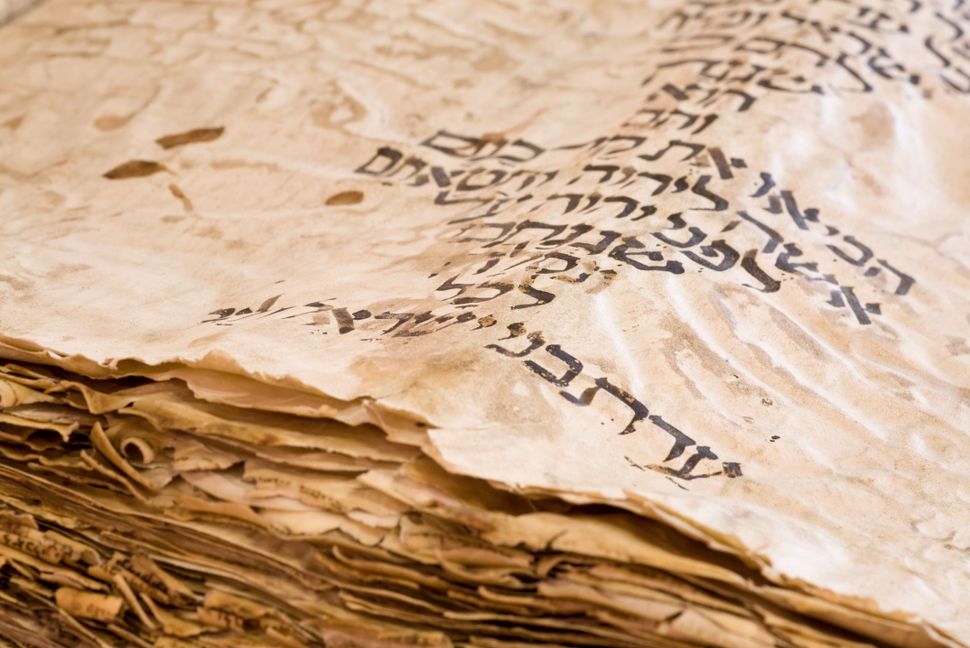Adam Kirsch Read the Classics of Jewish Literature So You Don’t Have To

Image by Arpad Benedek/istockphoto
Here are some fun facts from Adam Kirsch’s “The People and the Books: 18 classics of Jewish Literature.”
The name Esther is actually a Persian form of Istar, a Middle Eastern goddess of fertility, love and war — an unusual mix, even for a higher being.
Before he decided to go with his concept of a Jewish state, Theodor Herzl had another solution to anti-Semitism: mass conversion of Jews to Christianity.
Also, it turns out Jews are just a people of the book, not the people of the book. It is a phrase used in the Koran to designate Jews and Christians who have their own holy scriptures.

Adam Kirsch. Image by Remy Kirsch
Kirsch, director of the masters program in Jewish studies at Columbia University and a columnist for Tablet Magazine, spoke to Curt Schleier about his new book.
The Forward: You come off like a Torah scholar in this book. Is that what you are?
Adam Kirsch: I grew up in Los Angeles. We attended a conservative synagogue and I went to Hebrew school. The subjects I cover are all things I didn’t learn about there. They are not part of the standard Jewish educational curriculum in Hebrew school and even in orthodox school you’re not likely to reach about Philo [of Alexandria], who attempted to reconcile the Torah’s Jewish aspects with secular thought. These are all things I’ve explored since then to get a better understanding of what Judaism is and has been.
How did you make your selections?
I picked works where I felt the general reader wouldn’t know what was in them even if they knew the names of the writers.
What did you learn while researching your book?
One thing is the way certain themes or ideas keep coming back in new ways. So today, American Jews think a lot about their relationship to God and the Torah and the Jewish people are asking the same questions as Greek Jews living in the time of the Roman Empire and Spanish Jews in the Middle Ages.
How do you reconcile the Bible and modern science?
That’s another one of those big themes that keeps coming back. How do you make sense of the bible, which is not rational, not scientific. There have been different views. Writers like Maimonides said you can’t read it literally, it should be read as a metaphor. Spinoza said the bible was nothing more than a book of stories and choosing between science and Judaism he chose science.
Is anything in the Bible real?
That’s beyond my competence to say. There are different theories about that. The only part of the Torah that I write about is Deuteronomy, and one thing you can say is that there is no external support that these things happened and those people actually existed. You have to take it on faith.
The Forward is free to read, but it isn’t free to produce

I hope you appreciated this article. Before you go, I’d like to ask you to please support the Forward.
Now more than ever, American Jews need independent news they can trust, with reporting driven by truth, not ideology. We serve you, not any ideological agenda.
At a time when other newsrooms are closing or cutting back, the Forward has removed its paywall and invested additional resources to report on the ground from Israel and around the U.S. on the impact of the war, rising antisemitism and polarized discourse.
This is a great time to support independent Jewish journalism you rely on. Make a gift today!
— Rachel Fishman Feddersen, Publisher and CEO
Support our mission to tell the Jewish story fully and fairly.
Most Popular
- 1

Fast Forward Ye debuts ‘Heil Hitler’ music video that includes a sample of a Hitler speech
- 2

Opinion It looks like Israel totally underestimated Trump
- 3

Culture Is Pope Leo Jewish? Ask his distant cousins — like me
- 4

Fast Forward Student suspended for ‘F— the Jews’ video defends himself on antisemitic podcast
In Case You Missed It
-

News In Edan Alexander’s hometown in New Jersey, months of fear and anguish give way to joy and relief
-

Fast Forward What’s next for suspended student who posted ‘F— the Jews’ video? An alt-right media tour
-

Opinion Despite Netanyahu, Edan Alexander is finally free
-

Opinion A judge just released another pro-Palestinian activist. Here’s why that’s good for the Jews
-
Shop the Forward Store
100% of profits support our journalism
Republish This Story
Please read before republishing
We’re happy to make this story available to republish for free, unless it originated with JTA, Haaretz or another publication (as indicated on the article) and as long as you follow our guidelines.
You must comply with the following:
- Credit the Forward
- Retain our pixel
- Preserve our canonical link in Google search
- Add a noindex tag in Google search
See our full guidelines for more information, and this guide for detail about canonical URLs.
To republish, copy the HTML by clicking on the yellow button to the right; it includes our tracking pixel, all paragraph styles and hyperlinks, the author byline and credit to the Forward. It does not include images; to avoid copyright violations, you must add them manually, following our guidelines. Please email us at [email protected], subject line “republish,” with any questions or to let us know what stories you’re picking up.














